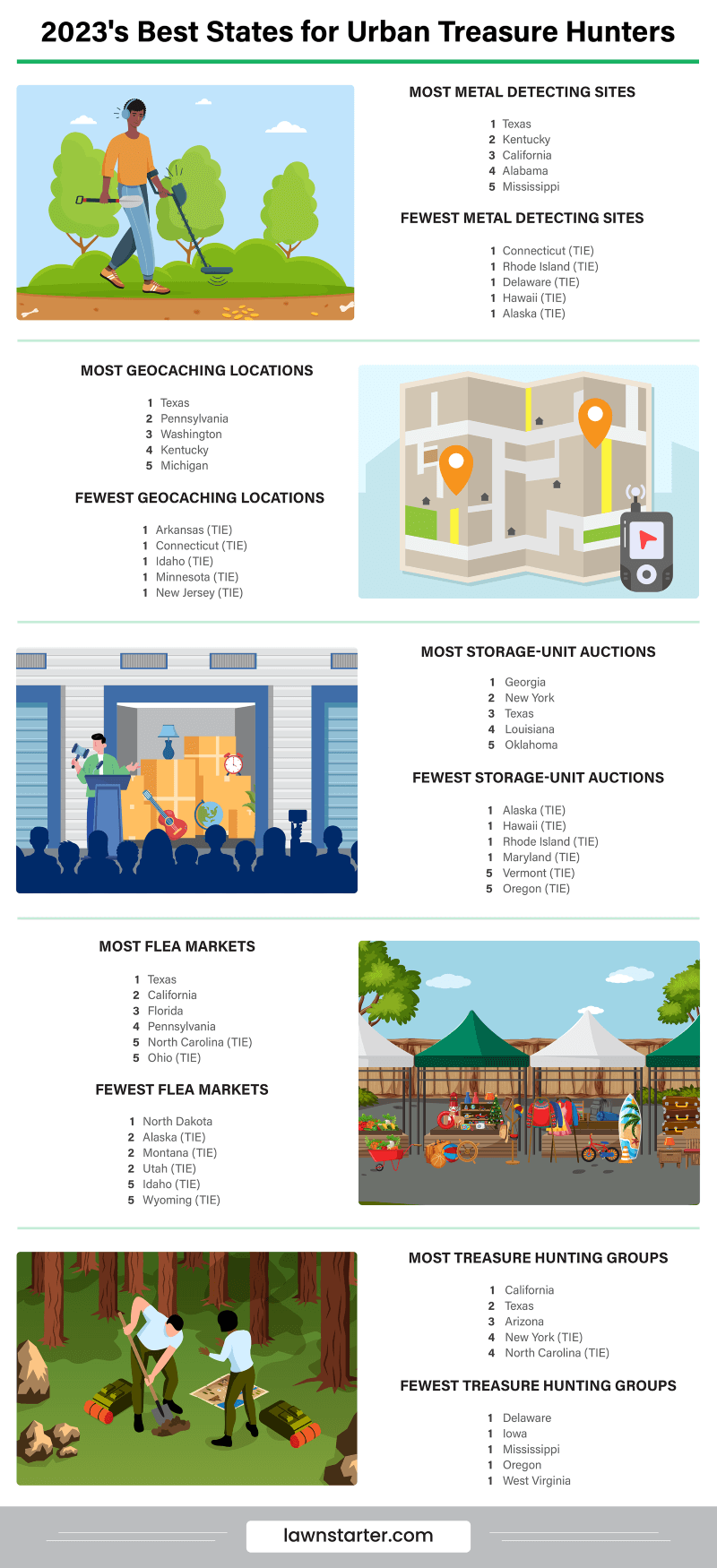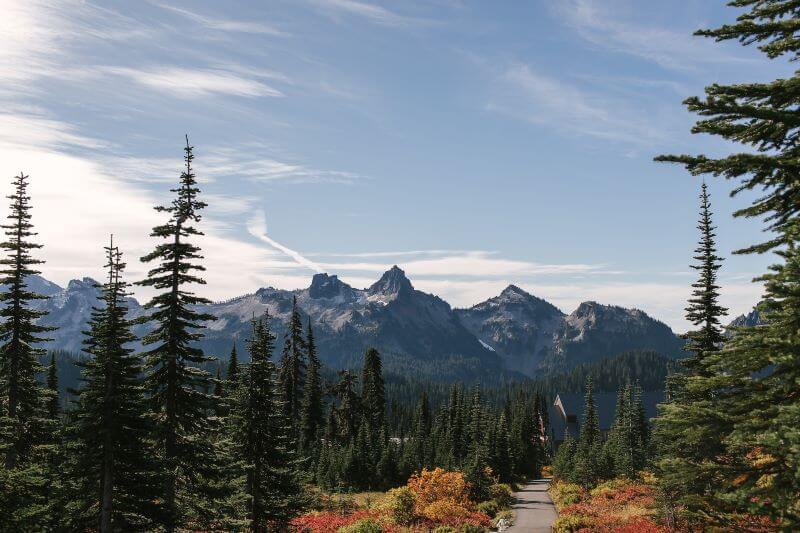
Where can modern-day treasure hunters discover “hidden gems” — literally and figuratively?
To mark National Scavenger Hunt Day on May 24, LawnStarter excavated the data landscape and ranked 2023’s Best States for Urban Treasure Hunters.
What is urban treasure hunting? We compared the 50 states based on the number of geocaching locations, antique shops, storage-unit auctions, and metal detecting clubs, among 14 total metrics. We also looked at whether each state allows metal detecting in state parks.
Dig in to see the top states for urban treasure seekers below. To learn how we ranked the states, see our methodology.
Editor’s note: This ranking is for entertainment purposes only. LawnStarter does not condone unlawful looting of archaeological artifacts and sites on protected federal lands and any other areas where treasure hunting is prohibited.
Contents
- State Rankings + Infographic
- Top 5 Close Up
- Key Insights
- Behind the Ranking
- What Is Urban Treasure Hunting?
State Rankings + Infographic
See how each state fared in our ranking:

Top 5 Close Up
Check out the slideshow below for highlights on each of our top five states.
Key Insights
The Gist
A golden opportunity awaits in the Golden State, our top destination for urban treasure hunters. That’s a fitting outcome for California, which drew in hundreds of thousands of gold prospectors from around the world in the mid-19th century. Treasure seekers remain active here, evidenced by California’s dominance in the Community and Supplies categories.
Buried at the bottom of our ranking are America’s biggest and smallest states. Wyoming and Montana — both national treasures to nature lovers — along with Delaware and Rhode Island make up four of our five worst states for finding urban treasures. North Dakota finished last. General lack of access to and interest in valuables dragged these five states down.
Standout Stats
- Finders Keepers: Only seven states have sites where “real” treasure is said to be buried — and in some cases even accessible to the public. One such state is Arkansas, where tourists are allowed to hunt for diamonds in a particular state park and retain their haul. In California’s Big Sur, beachgoers often spot jade washing up ashore.
- Blinged and Bejeweled: The Gold Rush might have ended in the 1850s, but California is clearly still the go-to state for precious metals and gemstones. The Golden State outranked the country in jewelry shops, totaling 2,510. That’s over 500 more than in New York and over 600 more than in Florida, our silver and bronze medalists in this metric.
- Trash to Treasure: One person’s garbage, they say, is another person’s treasure. Most of our top 10 states also lead in used-merchandise stores and flea markets. At No. 25 overall, North Carolina is the exception among these diamonds in the rough.
- Heavy Metal Band: Four states — California (No. 1), Texas (No. 2), Florida (No. 3), and Arizona (No. 10) — are ideal for metal detecting hobbyists. All earned high scores in gear access and metal detecting clubs. Each also allows metal detecting in state parks, but only Arizona doesn’t require permission. Regardless, it’s always good hygiene to check with state park authorities beforehand.
- Treasure Troves: If you want to get your hands on lost treasure like rare coins or silver, the South is your prime destination. Texas (No. 2), Kentucky (No. 18), Alabama (No. 14), and Mississippi (No. 31) make up four of the five states with the most metal detecting sites. However, the Lone Star State is the only one with over 1,000 sites.
- Storage Wars: You won’t have to outbid competitors for the auctioned contents of self-storage units in Georgia. At the time of writing, the Peach State listed the most auctions, 487. That’s 159 more than in New York in second place. Be willing to stretch your budget in Oregon and Vermont — these states listed only one auction each.
Texas and Florida, settings for the “Storage Wars” reality show, also ranked among the top 10 in this metric, while California placed 21st. - Cache App: With the most geocaching locations, 226, Texas is the best state for geocachers. The birthplace of geocaching, Washington, ranks third in this metric, with 70 fewer geocaching locations than in the Lone Star State. Today, there are over 3 million active geocaches hidden in 191 countries across all seven continents.
Behind the Ranking
First, we determined the factors (metrics) that are most relevant to rank the Best States for Urban Treasure Hunters. We then assigned a weight to each factor based on its importance and grouped those factors into three categories: Access, Supplies, and Community. The categories, factors, and their weights are listed in the table below.
For each of the 50 U.S. states, we then gathered data on each factor from the sources listed below the table.
Finally, we calculated scores (out of 100 points) for each state to determine its rank in each factor, each category, and overall. A state’s Overall Score is the average of its scores across all factors and categories. The highest Overall Score ranked “Best” (No. 1) and the lowest “Worst” (No. 50).
Notes:
Sources: Census Business Builder, Detect History, Flea Market Zone, Geocaching (Groundspeak), Kellyco Metal Detectors, Meetup, MetalDetector.com, StorageAuctions.com, Treehugger, U.S. Environmental Protection Agency, and Yellow Pages
What Is Urban Treasure Hunting?
Treasure hunting today doesn’t quite mean what it did centuries ago — we all value different things these days.
While many of us still hope to literally strike gold, some feel fortunate just to encounter a vintage vinyl record, a copy of a lost childhood book, or a mid-century modern chair.
Our “digging” tools have evolved with technology, too. Today, we turn to metal detectors, drones, and apps like OfferUp or online marketplaces like eBay to find rarities.
Some of us aren’t even interested in the actual treasure — we simply love the thrill of the hunt. That’s why geocaching and Pokémon GO became so popular. During the pandemic, these apps gave people a fun reason to get outside.
That was partly also millionaire Forrest Fenn’s goal. In 2010, Fenn encouraged recession-impacted America to explore the great outdoors by stashing a chest filled with jewels and gold nuggets in the Rocky Mountains.
At LawnStarter, we want everyone to enjoy the outdoors, too. If your backyard is so overgrown, it’s likely hiding some treasures. Hire a LawnStarter local pro for a cleanup.
If you’re after actual treasure, be careful and know where you are and are not allowed to search. Check your local rules, too. Most importantly, have fun.
Media Resources
- High-resolution image of infographic
- High-resolution images of cities
- High-resolution images of states
Main Photo Credit: Shutterstock









